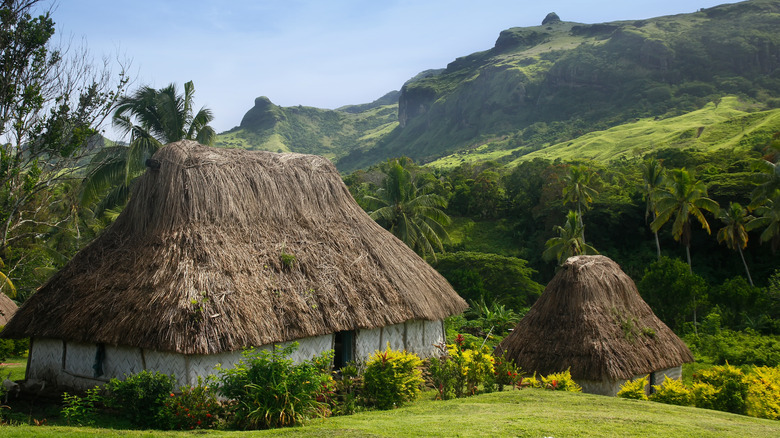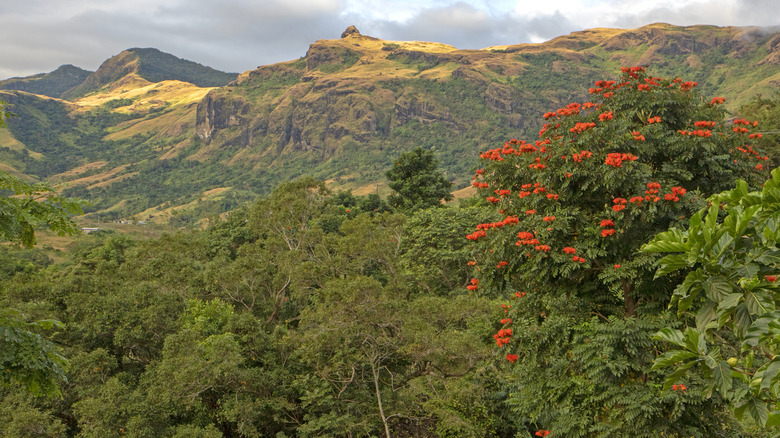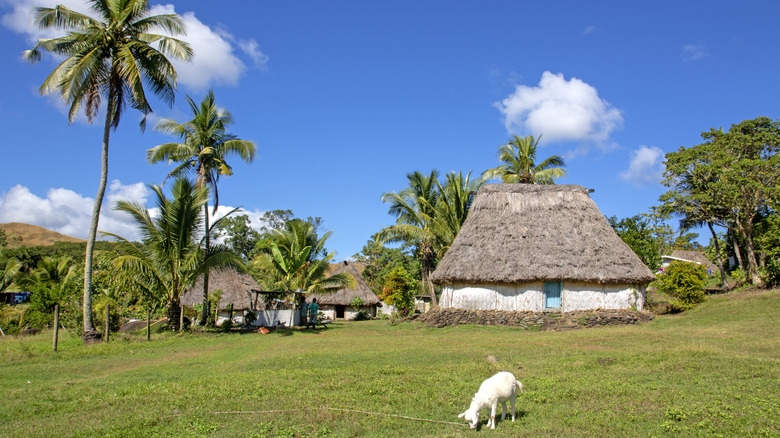The Remote Fijian Village Surrounded By Lush Mountains And Traditional Thatched Huts
When one thinks of Fiji, the remote archipelago in the South Pacific Ocean, one immediately imagines palm trees, crystal coastlines and rich, lush vegetation. This tropical paradise has 333 stunning islands, all with pristine beaches, waves that are perfect for surfing, gorgeous luxurious beach resorts, and warm weather all year round. It's also a beautiful island setting for several reality TV shows, including "Survivor," which has been filmed on the Mamanuca Islands for several seasons. But nowhere is the idyllic version of Fiji more exemplified than in Navala, perhaps the most picturesque village in the country, on the north-western coast of Viti Levu.
At this stunning, untouched village that has a population of only 1,000 people, you'll find thatched "bures," the traditional Fijian hut, and rural tranquility, with winding highland roads that take you into surrounding sugarcane fields. Backed by green mountains, the surrounding areas are flanked by the Ba River, adding to the beautiful, tranquil nature of this stunning area. In Navala you'll experience real Fijian culture, local hospitality, and the warmth of the nation.
Get to know the locals
To get to Navala you can take a minibus from Lautoka, which will take you approximately two hours and cost $1.50. The buses leave two or three times a day so if you'd like a more flexible trip, you can also rent a car, but be wary that many of the roads on the way are unpaved and that the signage in the area is sometimes poor or unclear. Renting a 4x4 is recommended over a regular car due to the rocky terrain, but no matter how you get there, the drive is scenic and very enjoyable. There are also guided tours you can take from Nadi, some which include hiking trails.
Navala, is the last traditional village on Vitu Levi Island that has bures. Sadly, this means that over time local traditions are disappearing, but a visit to Navala is the best way to experience Fiji in its original form. There is a small entrance fee to enter the village, which contributes to the village maintenance — the local townspeople generally subsist on farming and fishing rather than tourism. Upon arrival to Navala it is customary to attend a kava ceremony, welcoming outsiders to the village. This involves sharing a drink made from the crushed root of a kava plant, which has a mild relaxing effect. You can also tour the village and learn about the locals. As part of this you will also see some of the beautiful handmade crafts. The kava ceremony may also involve bathing in the Ba River. Always ask permission before taking photos during a ceremony to show your respect for the Indigenous community and do not refuse the kava as it is considered rude to do so.
Embrace local traditions
There are numerous conveniently placed resorts close to Navala. Tokatoka Resort Hotel is a mere five-minute drive from Navala village, and has luxury amenities such as a pool and spa. You can also opt to stay in one of the town's bures, where the host will provide a pillow and mat to sleep on and may also offer you hot meals. The charge should be approximately $8.50 for the stay, with food at an additional cost.
One of the most interesting things about Navala is that the bures in the town are all the same size, meaning that all the townspeople are equal. The 200 bures in Navala are made from bamboo and grass, using an ancient technique. Learning about local life and Fijian traditions is what makes a trip here so special. The people of Navala are deeply connected to the land, and demonstrate it in their peaceful way of interacting with nature. These are deeply spiritual people so it is important to respect their customs while visiting. Like the rest of Fiji, the climate here is warm and tropical and you may be tempted to wear sunglasses or hats. However, wearing anything on the head is considered disrespectful in Fiji, as the head is believed to connect people to heaven and blocks a clear spiritual pathway. Dressing modestly is also something that needs to be respected. Expect a trip here to be peaceful, meditative, and a way to embrace the land and traditions of Fiji.


